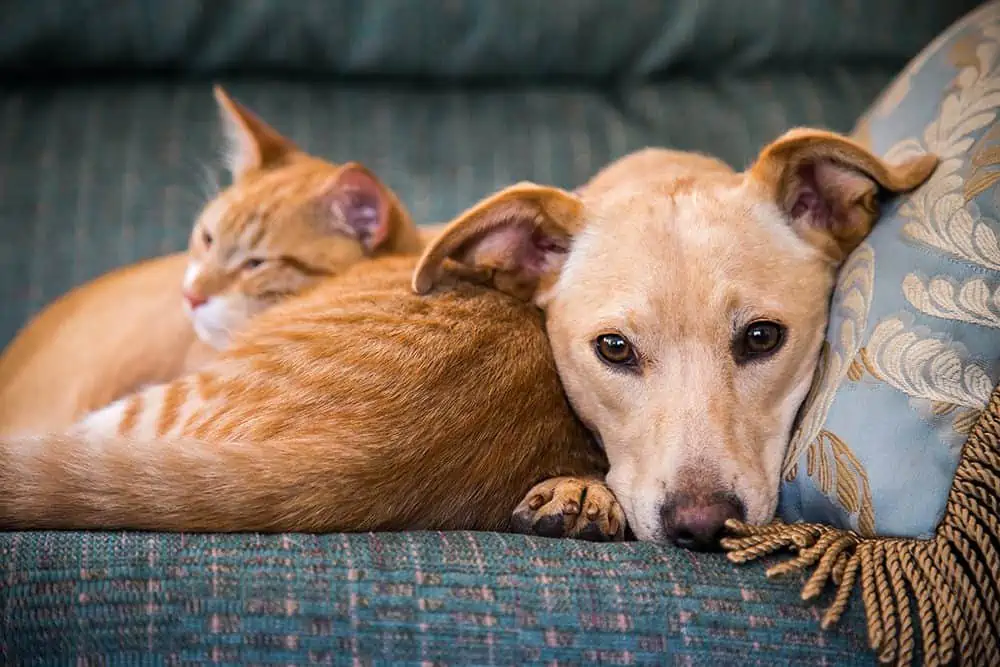
Seasonal Affective Disorder (SAD for short) is a condition that’s been recognised in humans since the 1980s. Also known as ‘winter depression’, the symptoms – which include a persistent low mood, lethargy and sleeping for longer – often begin when the autumn days get shorter, becoming more severe during December, January and February.
The cause isn’t fully understood, but the main theory is that a lack of sunlight might cause a part of the brain called the hypothalamus to stop working properly. This may increase the production of melatonin – the hormone that makes you feel sleepy – and decrease the production of serotonin – a hormone that affects mood, appetite and sleep.
DO YOU NOTICE A DIFFERENCE?
Whether our pets suffer from SAD is a hot topic among veterinary professionals. The PDSA carried out a survey that suggested one in three dog owners saw a difference in their dog’s behaviour during the winter. Whether this is due to SAD, or something else, is extremely difficult to prove.
As we share much of the same brain chemistry with dogs and cats – including the hormones melatonin and serotonin – it’s conceivable that our pets can suffer from SAD. But it’s not the only explanation.
FEELING MOODY
As dogs are so in tune with our moods, it could be a case that they are mirroring how their human is behaving. If we’re mooching around the house all day feeling fed up with the weather, it’s not really surprising that dogs and – to some extent – cats will pick up on that.
Another explanation is that the animal is feeling bored. In spring and summer, we’re more likely to spend lots of time outside with our pets, who thrive on all the sounds, scents and stimulation supplied by the Great Outdoors. When daylight is in short supply and time outside restricted, your dog might not be getting all the exercise and mental stimulation he needs. The same can be true of cats who like to spend the day outside exploring but, during the cold and wet winter months, are stuck inside for much of the time.
GET THROUGH WINTER TOGETHER
Whatever the cause, it’s important to ensure that your pets have as much access to daylight and fresh air as possible, as well as plenty of things to keep them occupied during the wintertime. Here are some things to try:
- Ensure your dog is walked at least once a day during daylight to soak up some vital Vitamin D and give serotonin levels a boost
- Make the most of sunny days to go for longer walks or to spend some time playing with your cat in the garden.
- When the sun comes up, open all the curtains to let as much natural light into your home as possible. Place your cat or dog’s bed near a sunny window – more light entering your pet’s pupils can have a positive effect on their brain chemistry. In addition, being able to watch the world outside provides welcome stimulation.
- Think up some exciting indoor games for your dog – such as ‘hide and seek’ with a favourite toy or some treats, bouncing a balloon on their nose and playing tuggie.
- Create a cat activity centre out of cardboard boxes for them to climb in and explore and invest in a fishing rod-style toy that you can swish about to encourage your pet to chase and grab.
- To keep your pets busy and promote foraging instincts, place food devices, such as filled Kongs or food puzzles, in different places around the house instead of feeding them from a bowl.
- Make time to interact with your animal companion every day to talk to them, play with them and to give them lots of attention and affection.
Remember that if your pet loses their appetite, has a decreased energy level or shows any other symptoms of being out of sorts that are unusual for them, visit your vet so they can rule out or treat any underlying health problems.














